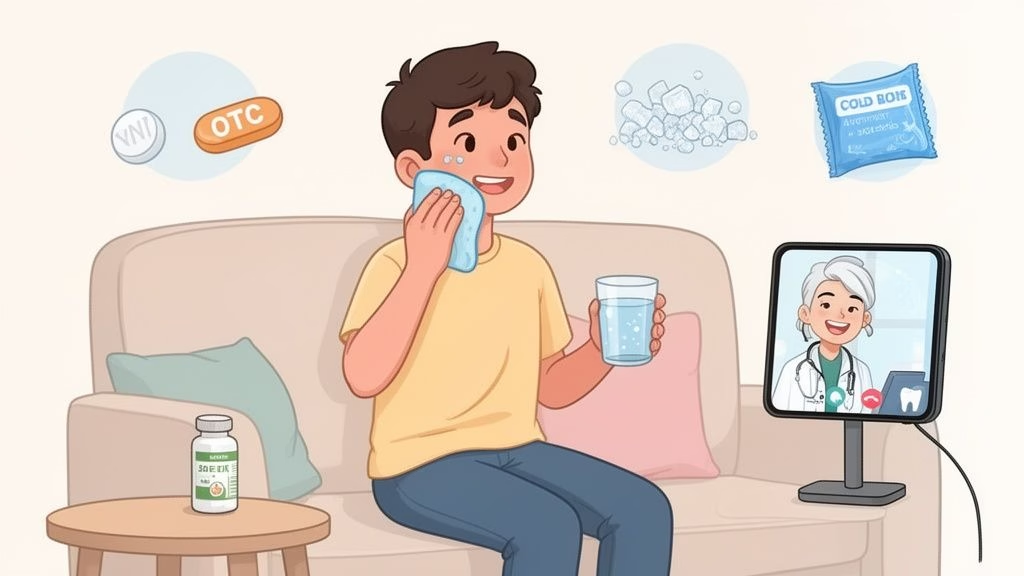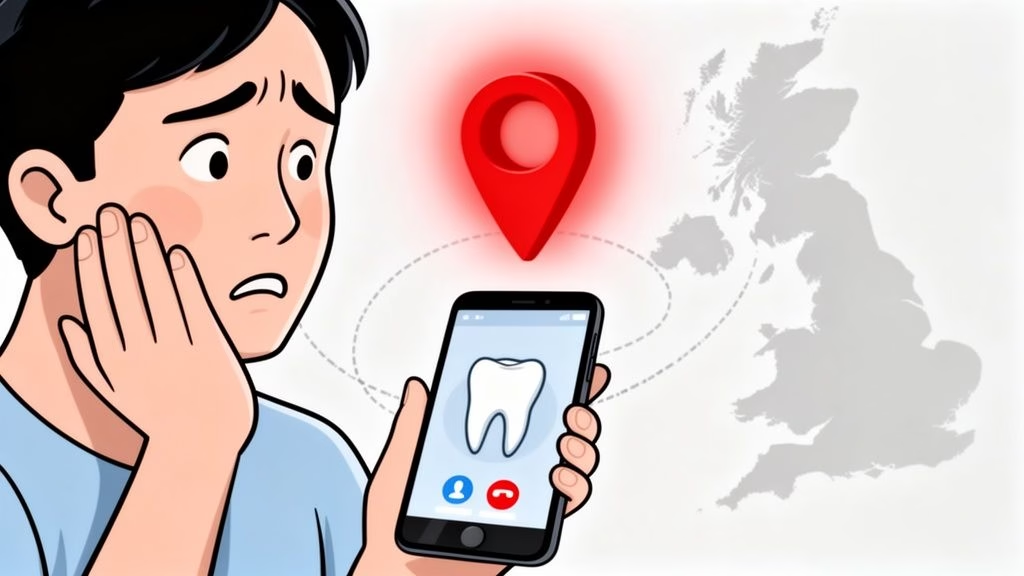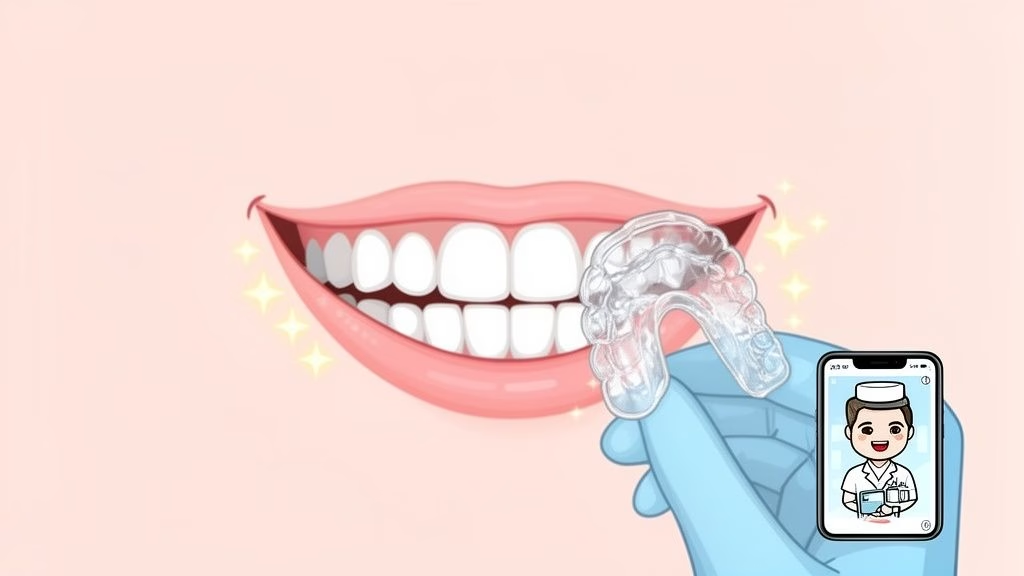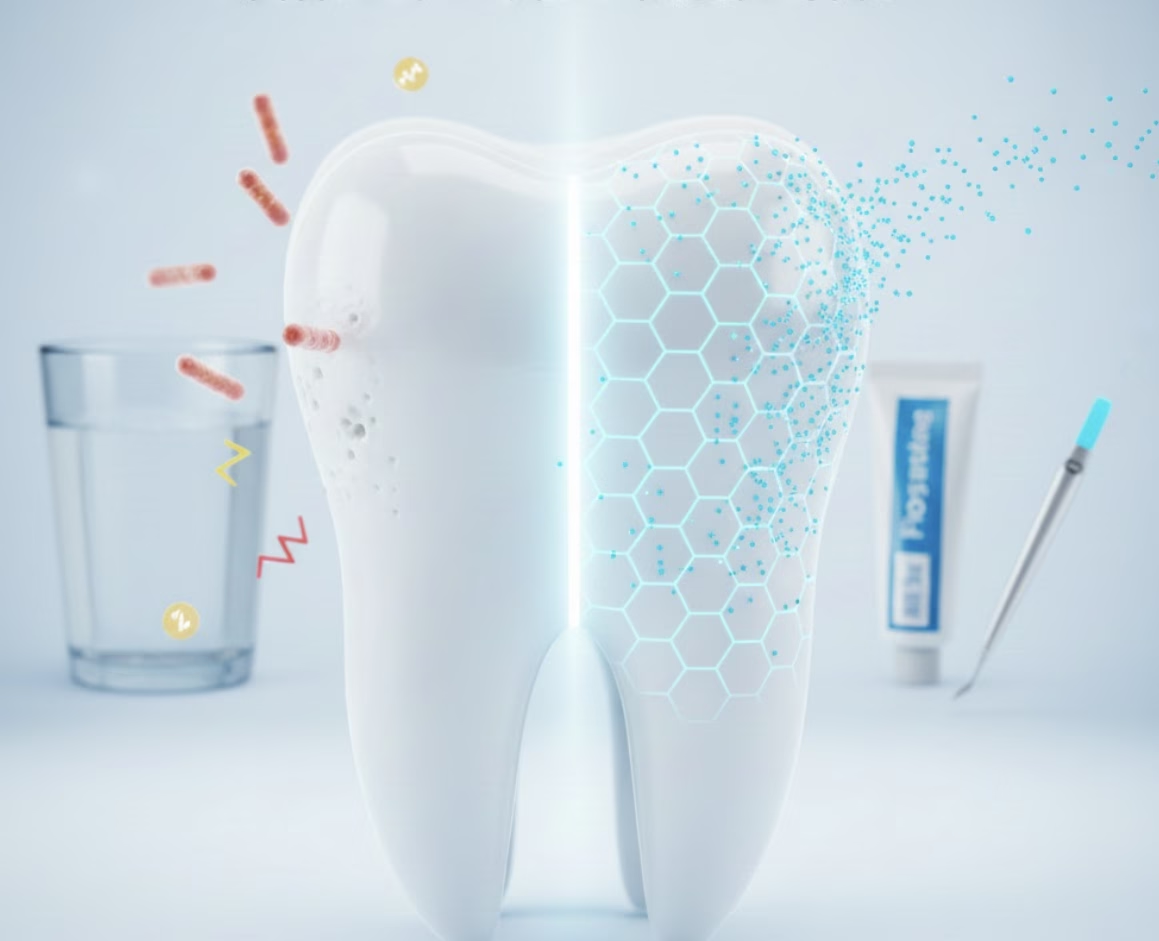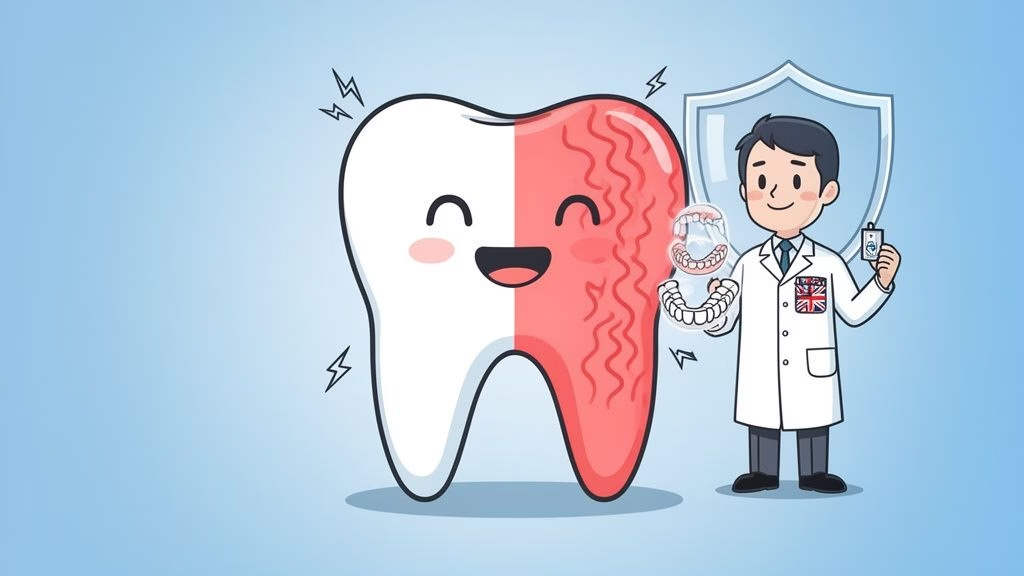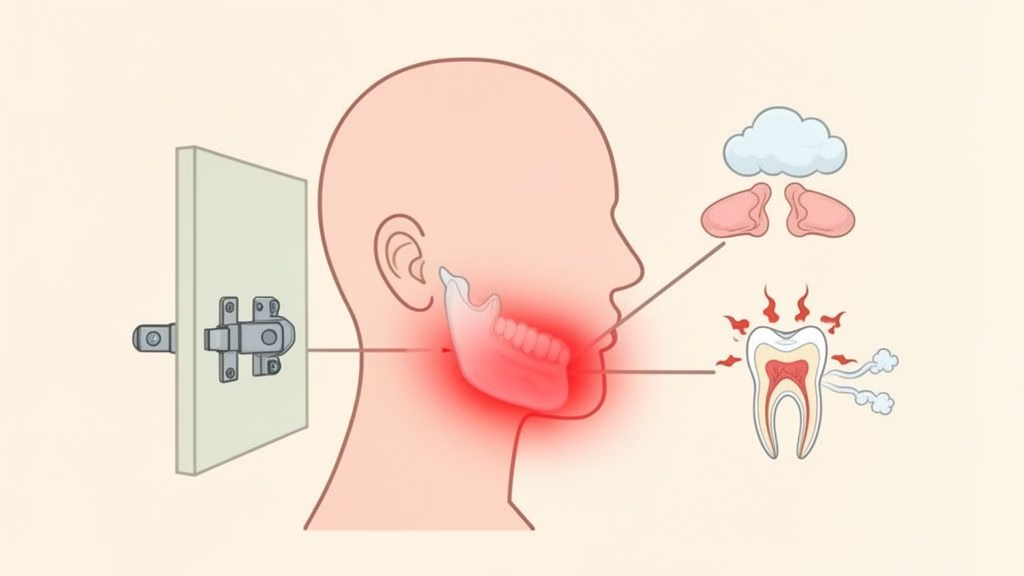How to Overcome Dental Anxiety: Tips for a Stress-Free Visit

If the thought of a dental appointment sends a shiver down your spine, you’re in good company. That feeling—the tight knot in your stomach, the racing thoughts—is incredibly common. The first step to overcoming dental anxiety is simply realising you’re not alone and that there are practical ways to regain control. It often starts with pinpointing what triggers your fear, talking openly with your dentist, and exploring modern, patient-friendly services like Toothfairy.
You’re Not Alone in Feeling Dental Anxiety
Let’s be honest: for millions of people, the dentist’s chair is one of the most dreaded places on earth. That sense of unease is a completely valid response, often stemming from past experiences, the unfamiliar sounds and smells, or just a general feeling of vulnerability. It’s not something you should just “get over.”
This isn’t a minor issue; it’s a major barrier to good oral health across the UK. It’s estimated that dental anxiety affects anywhere from 25% to over 50% of adults. Recent data paints an even starker picture, showing that more than 1 in 4 Britons—that’s over 14 million people—actively put off or cancel dental visits because of their fear. You can dig deeper into these UK dental anxiety trends on wecovr.com.
Common Triggers Behind Dental Fear
So, what’s really behind this widespread anxiety? Getting to the root of your own fear is the first real step towards managing it. While everyone’s experience is unique, most fears trace back to a few common sources.
- Sensory Overload: It often starts before you even sit in the chair. The clinical smell, the whirring sound of a drill, the intensely bright light—these can all put your senses on high alert.
- A Bad Memory: It only takes one painful or traumatic visit, particularly as a child, to create a deep-seated fear that can last a lifetime.
- Fear of Pain or Needles: For many, the dread isn’t about the check-up itself but the anticipation of pain. The mere thought of an injection is enough to trigger a full-blown phobia.
- Loss of Control: Lying back in a chair, unable to see what’s happening while someone works inside your mouth, can make you feel incredibly helpless and vulnerable.
By identifying your specific triggers, you can start to dismantle the anxiety piece by piece. Naming the fear is the first step to taming it.
Modern Dentistry Is Changing the Experience
The good news? Dentistry is evolving. The old-school, intimidating approach is slowly being replaced by one that puts patient comfort first. New technologies and a greater understanding of patient psychology are helping to create a far less stressful environment.
Companies like Toothfairy are at the forefront of this change, offering a smarter and more affordable way to straighten teeth, handle a dental emergency, or get cosmetic dental work done. Imagine straightening your smile with clear aligners from home, handling an emergency with a quick video call, or planning cosmetic treatments entirely on your terms.
This shift puts the power back in your hands, which is a game-changer for anyone learning how to overcome dental anxiety for good.
How to Prepare for Your Visit and Take Back Control

One of the best ways to start managing dental anxiety is to regain a sense of control. When we feel powerless, fear tends to take over. But by taking a few practical steps before you even leave the house, you can transform the experience from something that happens to you into a situation you are actively managing.
This journey starts at home, with a few conscious choices that put your comfort first and set the stage for a much calmer, more successful visit.
Get Strategic With Your Planning
A simple but incredibly effective trick I always recommend is to book a morning appointment. Why? Because it leaves you with less time to dwell on it. You can get in, get it done, and get on with your day without hours of anxious anticipation building up.
It’s also crucial to remember that not all dental practices are the same. Do a little research and find a team that openly says they welcome and support nervous patients. A quick look at their website or a straightforward question over the phone will tell you a lot. You’re looking for a team that listens, not one that might dismiss your feelings.
Speak Up and Be Your Own Advocate
Being open about your anxiety isn’t a weakness—it’s one of the strongest things you can do for yourself. When you call to book, be upfront about how you feel. You don’t need to share your life story, but a simple heads-up can make a world of difference.
Try saying something direct, like:
- “I’d like to book a check-up, and I just want to let you know that I’m a very nervous patient.”
- “Could you please add a note to my file that I have quite a bit of dental anxiety?”
- “I’ve had some bad experiences before, so I really need a dentist who is patient and will explain what they’re doing.”
This one small step alerts the team to your needs before you even arrive, allowing them to adjust their approach and give you the extra support you deserve. It also helps you realise just how common this is. You are definitely not alone.
Surveys show that a full-blown dental phobia affects about 17% of people in the UK, and around 52% of adults admit to having some fear of the dentist. It’s often the anticipation that’s worse than the reality. You can read more about these stats over at 543dentalcentre.co.uk.
Try a Little Mental Rehearsal
Practical prep is important, but so is getting your head in the right space. Athletes and performers use visualisation all the time to calm their nerves and improve their outcomes, and there’s no reason you can’t do the same for your dental visit.
In the days before your appointment, find a few quiet minutes to close your eyes and imagine the visit going really well. Picture yourself walking into the clinic feeling composed, sitting in the chair feeling relaxed, and leaving afterwards with a genuine sense of relief and accomplishment. By mentally rehearsing a positive outcome, you start to rewire your brain’s automatic association of the dentist with panic.
A little bit of planning goes a long way. Before you head to your appointment, run through this simple checklist to make sure you’ve set yourself up for a calm and positive experience.
Your Pre-Appointment Anxiety Reduction Checklist
| Action | Why It Helps | Example |
|---|---|---|
| Eat a light meal | Avoids low blood sugar, which can increase anxiety and jitteriness. | Have a small bowl of porridge or a banana about an hour before you go. |
| Avoid caffeine & sugar | These are stimulants that can make your heart race and heighten feelings of anxiety. | Stick to water or herbal tea on the morning of your appointment. |
| Wear comfortable clothes | Feeling physically comfortable can help you feel more mentally at ease. | Choose loose-fitting clothing and layers in case the room is cool. |
| Plan a reward | Having something nice to look forward to gives you a positive focus. | Plan to meet a friend for coffee or watch your favourite film afterwards. |
| Bring distractions | A podcast, music, or an audiobook can help you tune out clinic sounds. | Load up your phone with a playlist or a podcast episode before you leave. |
Thinking through these small details beforehand helps you walk in feeling prepared and in control, not like you’re just showing up and hoping for the best.
Coping Strategies for the Dental Chair

Alright, you’ve made it to the appointment. You’re in the chair. This is often where the real challenge kicks in. No matter how much you’ve prepared, the clinical environment itself can feel overwhelming.
Having a few simple, powerful techniques ready to go can make a world of difference. These aren’t complicated psychological tricks; they are practical, in-the-moment actions to help you manage rising anxiety and stay grounded.
Master Your Breathing
It’s an automatic reaction: when we get anxious, our breathing gets shallow and quick. This just fuels the panic cycle. The good news is that you can consciously take back control and send a direct message to your nervous system to calm down.
One of the most effective methods I recommend is controlled breathing. It’s discreet and incredibly powerful, even when you’re lying back in the chair.
- Try the 4-7-8 method: Breathe in quietly through your nose for four seconds. Hold that breath for a count of seven. Then, breathe out slowly and completely through your mouth for eight seconds. Just repeating this cycle three or four times can work wonders.
This simple exercise genuinely slows your heart rate and helps short-circuit your body’s fight-or-flight response.
Ground Yourself in the Present
Grounding techniques are brilliant for pulling you out of a spiral of anxious thoughts. They anchor you in the here and now by shifting your focus to physical sensations, reminding your brain that you’re actually safe.
Here are a few grounding exercises you can try without anyone even noticing:
- Focus on your feet: Really concentrate on the feeling of your feet flat on the floor or the footrest. Wiggle your toes. Feel the solid connection.
- Use your hands: Clench your hands into fists for five seconds, then slowly release them. Pay close attention to the feeling of tension melting away.
- The 5-4-3-2-1 game: Silently name five things you can see, four things you can feel (the texture of the chair, the cool air), three things you can hear, two things you can smell, and one good thing you can think about.
Practising relaxation techniques at home makes them easier to call upon when you really need them. Exploring different mindfulness activities for adults can build your mental toolkit, making it much easier to find that sense of calm in the chair.
The Power of Distraction
Let’s be honest, sometimes the best defence is a good offence—or in this case, a good distraction. Giving your brain something else to do is a surprisingly effective way to get through a dental appointment.
Don’t underestimate the power of a good distraction. Bringing headphones and queuing up a favourite playlist, a gripping podcast, or an audiobook can create your own personal sanctuary, insulating you from the sounds of the surgery.
This works because our brains aren’t great at multitasking. If you immerse yourself in something you enjoy, you starve the anxiety-inducing triggers of the attention they need to thrive.
Establish a Stop Signal
Feeling a lack of control is a massive trigger for dental fear. The single most empowering thing you can do is agree on a “stop” signal with your dentist before you even start.
It’s usually just a simple hand gesture, like raising your left hand. This signal means “I need a moment,” and your dental team will respect it immediately, no questions asked.
Just knowing you have this power can slash your anxiety levels. It puts you back in the driver’s seat and confirms that you are in charge. It turns the appointment into a partnership, with everyone working together to make your visit as comfortable as possible.
How Modern Dentistry Is Easing Patient Fears
Let’s be honest, the classic image of a cold, intimidating dental clinic is something many of us would rather forget. Thankfully, that picture is quickly becoming a thing of the past. Dentistry is undergoing a quiet revolution, driven by changes that make the whole experience less daunting and far more comfortable.
If you’re trying to figure out how to overcome your own dental anxiety, you’ll be relieved to know that modern practices are actively dismantling the very things that cause fear.
Think about the sound of the drill—that high-pitched whine is a classic trigger. Today, it’s being replaced by quieter, more precise tools. What about those messy, gag-inducing impression moulds? They’re being phased out for quick and easy digital scanners that create a perfect 3D model of your teeth in seconds. These aren’t minor tweaks; they fundamentally change how a dental visit feels.
This chart really drives home how simple shifts in communication and environment can make a world of difference for patients.
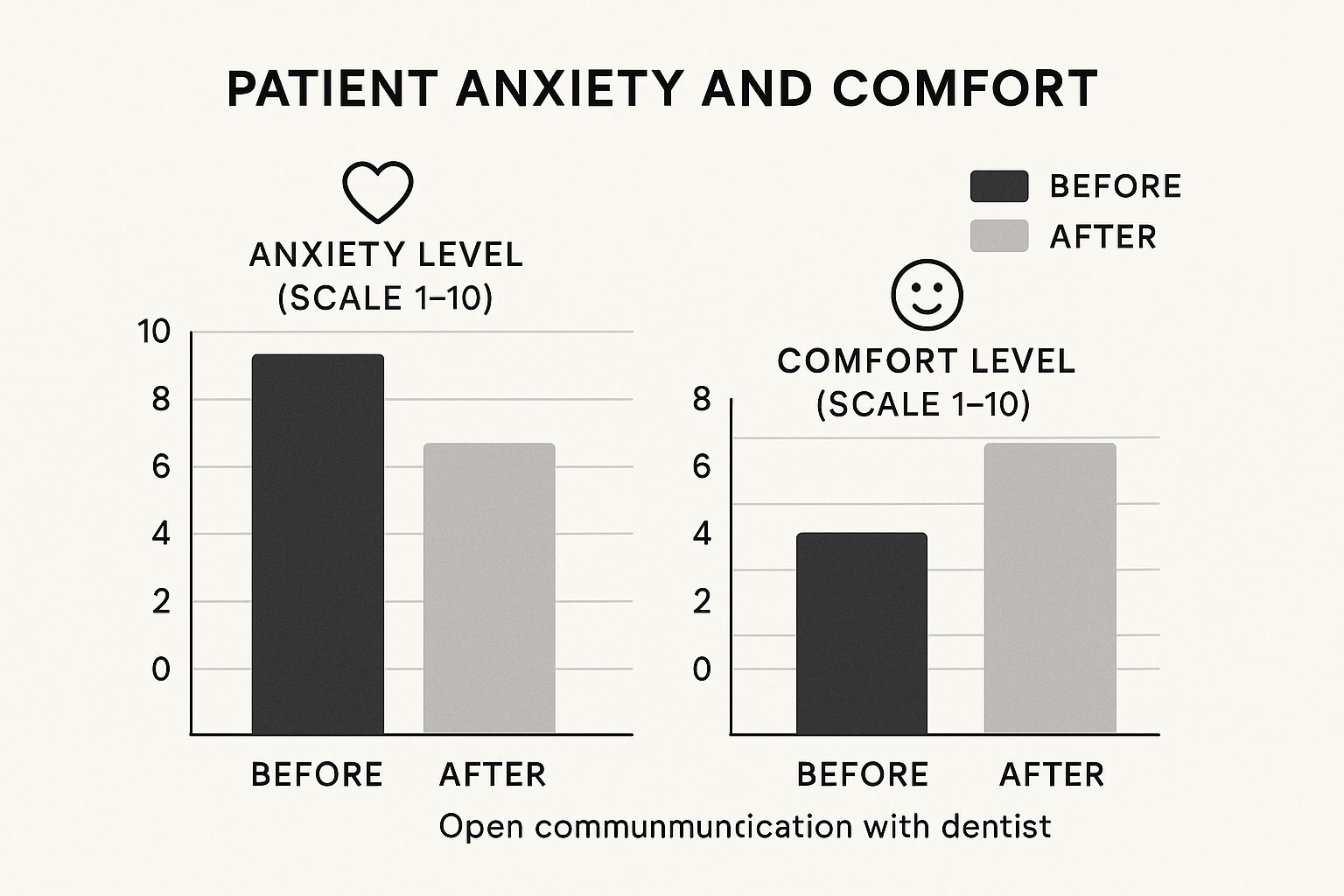
The data is clear: when people feel heard and informed, their anxiety plummets while their comfort levels soar. It’s solid proof that putting the patient first truly works.
A New Model Built Around Your Comfort
It’s not just about better tools in the clinic. The entire model of dental care is being re-imagined to tackle anxiety where it starts. This new approach is all about giving you more control, more transparency, and more convenience than you’ve ever had before.
Essentially, it’s about making dental care fit into your life, not forcing you to fit your life around it.
This patient-first philosophy is the foundation of what we do at Toothfairy. We realised that for so many people, the fear isn’t just about the treatment itself. It’s the whole package: the sterile waiting rooms, the shock of an unexpected bill, the hassle of booking appointments. By redesigning how care is delivered, we can get rid of these common hurdles.
The future of dentistry is one where you are in control. It’s smarter, more affordable, and built entirely around your comfort and schedule, removing the traditional barriers that fuel anxiety.
Let’s say you’re thinking about straightening your teeth. The idea of constant, lengthy visits for aligner adjustments can be a massive source of stress. The Toothfairy model, for example, lets you get fantastic results with clear aligners right from your own home. You’re guided every step of the way by qualified UK dentists through our app, which cuts out countless appointments and puts you firmly in charge.
Traditional Dentistry vs Modern Patient-Centred Care
The difference between the old way and this new, patient-focused approach is night and day. Once you see the comparison, you’ll realise how many common anxiety triggers are simply being designed out of the experience.
| Anxiety Trigger | The Traditional Experience | The Modern Toothfairy Approach |
|---|---|---|
| Unexpected Costs | Vague pricing and the dread of a surprise bill after treatment. | Transparent pricing is provided clearly upfront for all treatments. |
| Emergency Panic | Frantic calls trying to find an open out-of-hours clinic. | Instant virtual access to a dentist for immediate emergency advice. |
| Inconvenient Visits | Having to take time off work for frequent, short appointments. | At-home solutions like clear aligners monitored remotely. |
| Feeling Judged | Worrying about what the dentist will think or say about your teeth. | A supportive, non-judgmental environment focused on finding solutions. |
This evolution in dental care isn’t just a nice-to-have; it’s a powerful tool in your mission to overcome dental anxiety for good. It proves that looking after your oral health doesn’t have to be a source of fear—it can be an empowering part of your self-care routine.
Building Lasting Confidence in Your Oral Health
Getting past dental anxiety isn’t a one-and-done deal; it’s more like building a new, healthier relationship with your own wellbeing. The real goal isn’t just to make it through your next appointment without panicking. It’s to slowly reshape how you see dental care, turning it from something you dread into a positive, essential part of looking after yourself.
The best way to start is by taking small, manageable steps that feel achievable. You don’t have to jump straight into a complex procedure. Why not just book a simple consultation to talk things through? Or maybe even a quick tour of the practice? These low-stakes visits let you get comfortable with the surroundings and the people, all on your own terms.
Every time you complete one of these small steps, it chips away at the old fear. When you get through a check-up, actually take a moment to pat yourself on the back. Acknowledge that you did it. This kind of positive reinforcement is powerful stuff; it genuinely helps rewire the anxious connections your brain has built up over the years.
Staying on Track for the Long Haul
Once you start making progress, the key is to avoid slipping back into the old cycle of putting things off. It’s a natural human response to avoid things that make us anxious, but in dentistry, that avoidance almost always leads to bigger problems.
It’s a pattern backed up by solid research here in the UK. Studies have consistently shown that people with higher dental anxiety are far more likely to wait until they’re in serious pain before seeking help.
A detailed study involving over 1,500 UK adults revealed some telling figures. While a full 7.8% had a diagnosable dental phobia, an additional 15.3% reported high levels of dental anxiety. Unsurprisingly, this fear was directly linked to avoiding the dentist, especially for more involved procedures like oral surgery. You can read the full breakdown of these UK dental anxiety findings on pmc.ncbi.nlm.nih.gov.
This is precisely why breaking that cycle is so crucial for your health. To keep yourself motivated, it helps to focus on all the good things that come with regular dental care—benefits that extend way beyond your teeth.
- Your Whole Body Will Thank You: Good oral hygiene is linked to a lower risk of serious health problems like heart disease and diabetes.
- A Real Confidence Boost: When you feel good about your smile, it shows. It can make a huge difference in how you carry yourself and interact with others.
- No More Emergency Pain: Staying on top of your dental health means catching small issues before they become painful, expensive emergencies.
A Fresh Take on Dental Care
Ultimately, learning how to overcome dental anxiety comes down to a shift in mindset. It’s about moving from a place where dental care is something to be feared and endured, to seeing it as a proactive choice you make for your own health and happiness.
And today, modern approaches are making that shift much easier. Take teeth straightening, for example. If you’ve always wanted a straighter smile but couldn’t face the thought of constant clinic visits, services like Toothfairy offer a completely different way forward. You can use their clear aligners from home, with your progress monitored remotely by qualified UK dentists through an app.
This approach neatly sidesteps many of the traditional anxiety triggers. It puts you in the driver’s seat, making a big cosmetic change feel manageable and accessible, not daunting. When you choose a path that fits your comfort level, you’re doing more than just improving your smile—you’re proving to yourself that you can take control of your oral health for good.
Your Questions About Dental Anxiety Answered
Even with the best game plan, you’re bound to have some specific worries pop up as you learn to manage your dental anxiety. Getting straight answers to these “what if” questions is a massive part of building your confidence before you even sit in the chair. Let’s tackle some of the most common concerns I hear from patients.
What if I Cry or Have a Panic Attack?
First off, let yourself off the hook. This is a huge fear for many people, but I can assure you that any good dentist has supported patients through this exact situation. We are trained to help people, not just teeth, and that includes managing anxiety.
If you feel those overwhelming emotions bubbling up, just use that ‘stop’ signal we talked about. Your dental team will immediately pause and give you the space you need to breathe and recentre yourself. There is absolutely no judgment. It’s perfectly okay to be emotional; we understand it’s a real reaction to fear, and our job is to help you through it.
Can I Ask for More Numbing Agent if I Feel Anything?
Yes, absolutely. You should never just “tough it out.” Modern local anaesthetics are fantastic, and your dentist’s goal is for you to be completely numb and comfortable.
The moment you feel even a hint of discomfort, give that ‘stop’ signal. It’s incredibly simple for them to add a bit more anaesthetic and wait a minute for it to work its magic. Seriously, don’t ever hesitate. Your comfort is the top priority.
Your voice is the most important tool you have in the dental chair. Never be afraid to ask for a break, more numbness, or even just a rinse of water. A compassionate dentist will always listen and adjust to your needs.
Will the Dentist Judge Me for the State of My Teeth?
This is the big one. This fear keeps so many people away from the care they need, and it’s heartbreaking. Please believe me when I say, dentists have seen it all. Our job is not to judge; it’s to help you get healthier, starting from right where you are today.
I always tell my patients to think of it like this: you wouldn’t expect a personal trainer to shame you for being out of shape, would you? Of course not! Their focus is on creating a plan to get you to your goals. A dentist’s mindset is exactly the same—we’re focused entirely on solutions for a healthier future, not on the past.
Are There Less Scary Ways to Straighten My Teeth?
Definitely. This is one area where modern dentistry has made huge strides, especially for anxious patients. If the idea of traditional metal braces with all those poky wires and frequent, intensive adjustments fills you with dread, you’ll be relieved to know there are much kinder alternatives.
For example, clear aligner systems from companies like Toothfairy have completely changed the game. They’re designed to be managed mostly from your own home.
- Fewer trips to the clinic: Your progress is tracked remotely by UK-based dentists using a simple app. This cuts down on in-person appointments dramatically.
- You’re in control: The whole process fits around your life, not the other way around. You manage your treatment without the stress of constant clinical visits.
- No metal in sight: The aligners are smooth, clear, and comfortable, so you skip the discomfort that often comes with old-school braces.
Options like these make straightening your teeth feel far less intimidating than older methods from a specific aligner brand. They put the power back in your hands, letting you improve your smile on your own terms.
Ready to move towards a healthier, more confident smile without all the stress? With Toothfairy, you can get expert dental care for teeth straightening, emergencies, and cosmetic treatments, all from your phone. Discover a smarter, more affordable way to care for your teeth by visiting us at https://www.toothfairyapp.co.uk.
Last updated on August 21, 2025

Toothfairy Care Team
Toothfairy, is the world's smartest dental app, that connects patients to a dentist for a range of issues, from emergencies, cosmetics, prescriptions to virtual exams.
Toothfairy Care Team
Toothfairy, is the world's smartest dental app, that connects patients to a dentist for a range of issues, from emergencies, cosmetics, prescriptions to virtual exams.
